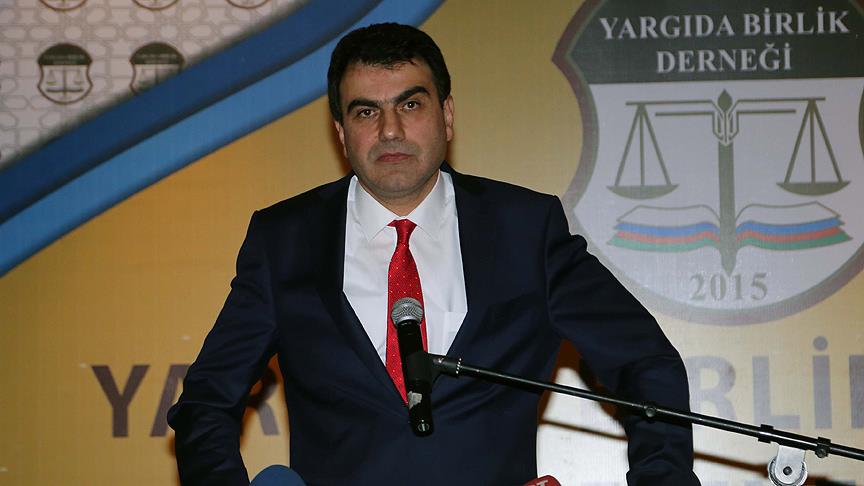Levent Kenez/Stockholm
Turkish President Recep Tayyip Erdogan made a significant decision on September 13 involving a dismissal and appointment at the Ministry of Defense, appointing a judge who has no training or expertise in military or defense affairs as a deputy minister at the ministry.
Erdogan appointed Musa Heybet, a founding member and former president in 2017 of the pro-government judiciary association Yargıda Birlik (Unity in the Judiciary) as a deputy minister of defense. Yargıda Birlik was established in 2015 to increase Erdogan’s influence in the judiciary and is known for its pro-government judges and prosecutors. Heybet was part of a team responsible for creating profiling lists used to purge Erdogan’s opponents from the judiciary. He previously had served as a deputy undersecretary at the Ministry of Justice, and following a failed coup in 2016 was at the helm of the court overseeing appeals related to dismissals from public service implemented by the Erdogan government. Essentially, he was reviewing the appeals of civil servants who had been dismissed based on the lists he helped prepare.
Hasan Dursun, a Turkish member of the CrossBorder Jurists Association in Germany and a prosecutor forced into exile after being dismissed in late 2016, believes that Heybet is far from an ordinary civil servant. Dursun claims that Heybet, who is known to receive direct instructions from Erdogan, played a crucial role in the politicization of the judiciary and in legitimizing the government’s unlawful decisions.

According to Dursun, Heybet’s appointment as a deputy minister of defense while serving as a member of the Council of State is a clear indication of how the judiciary operates under the influence of the ruling party. He argues that this appointment exemplifies the extent to which the judiciary is motivated and controlled by the government.
Dursun reflects on a time when judges were reluctant to accept appointments under the authority of the ruling party but notes that now, there’s no shame in establishing political connections with the government.
Dursun believes that Heybet’s rise to the position of deputy minister was largely due to his success in placing the judiciary under the government’s control through Yargıda Birlik. He also emphasizes that Heybet’s coordination with the National Intelligence Organization (MİT) before and after the controversial 2016 coup attempt played a significant role in his appointment.
According to official statistics, the initial government campaign in 2016 resulted in the purge of 4,359 judges and prosecutors, with hundreds more subsequently subjected to specious criminal investigations in the ensuing years, resulting in a total of 4,646 individuals affected. In essence, approximately 30 percent of all judges and prosecutors found themselves dismissed from their positions.
In the same year the Erdogan government quickly moved to address the vacancies by appointing 3,800 new judges and prosecutors. However, these appointments were based on political allegiance rather than the principles of a meritocracy. Approximately half the newly recruited individuals were lawyers who had served in branches of Erdogan’s ruling Justice and Development Party (AKP). The remaining appointees were vetted to ensure their adherence to the ideology of the Islamist government, thereby guaranteeing alignment with the government’s preferences in their rulings.

The timing of Heybet’s appointment as a deputy minister of defense is noteworthy, coming on the heels of a significant event on August 30. Following the Turkish Military Academy’s graduation ceremony, which was attended by President Erdogan, a group of newly commissioned officers privately recited the traditional oath, a practice that had been absent from the official graduation program since 2016. Among them, a smaller group chanted, “We are the soldiers of Mustafa Kemal,” a slogan associated with secularist sentiment in Turkey. This incident was widely interpreted as a military reaction against Erdogan’s Islamist policies and was seen as a revival of the longstanding notion that the military is the guardian of Turkey’s secular republic. After a prolonged period of silence, Erdogan announced that those who participated in and organized the recitation of the oath would be dismissed from the military. Given Heybet’s background and previous experience in overseeing judicial purges, he could potentially play a role in future purges within the armed forces.
Another interesting aspect of Heybet’s appointment is the dismissal of his predecessor, Celal Sami Tüfekçi. Tüfekçi, who has a bachelor’s degree in mechanical engineering from Gazi University, a master’s degree from Northeastern University in Boston and a Ph.D. from New York’s Rensselaer Polytechnic Institute, had a distinguished background.
Dr. Tüfekçi began his professional career as a project engineer at Pitney Bowes, headquartered in Shelton, Connecticut, where he contributed to patented work in high-performance motion control. He later served as director of the space department at the Presidency of the Defense Industry, managing high-resolution indigenous GÖKTÜRK-1 satellite launch programs.
He was appointed as a deputy defense minister in the new cabinet formed after the general election of May 28, 2023, just one-and-a-half years ago.
Tüfekçi, like Heybet, was also a staunch supporter of Erdogan. Consequently, his dismissal may be linked to potential conflicts with Erdogan-aligned businessmen in the military contracts for which he was responsible. Additionally, it remains unclear whether Heybet will continue to serve on the boards of state-owned defense companies where he previously held positions.
Meanwhile, it is well known that Selçuk Bayraktar, Erdogan’s son-in-law and one of the owners of Baykar, the company producing Bayraktar military drones, has had significant influence over appointments to the Ministry of Defense for an extended period of time
There is no regulation specifying the number of deputy ministers in a given ministry; this number is entirely at Erdogan’s discretion. For this reason, Heybet’s appointment in place of Tüfekçi raises questions. Meanwhile Yankı Bağcıoğlu, the main opposition Republican People’s Party (CHP) vice president for national defense policy who supported the dismissals from the military in 2016 and is a nationalist figure with a military background, stated, “We find it difficult to understand the removal of a deputy minister like Celal Sami Tüfekçi, who has experience in defense projects and has held critical positions, and his replacement with a bureaucrat who has not been involved in any defense projects.”
During his tenure the CHP complained about Tüfekçi engaging in partisan activities and the heavy involvement of Islamist foundations in placing their affiliates in military companies












